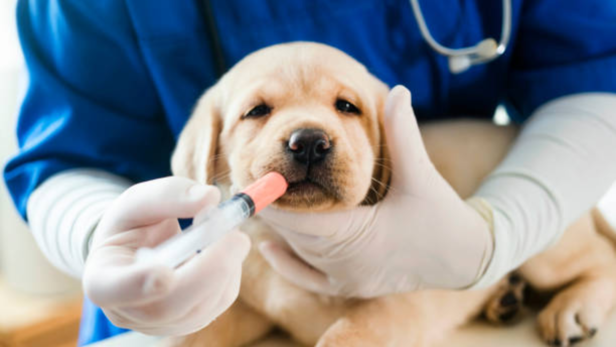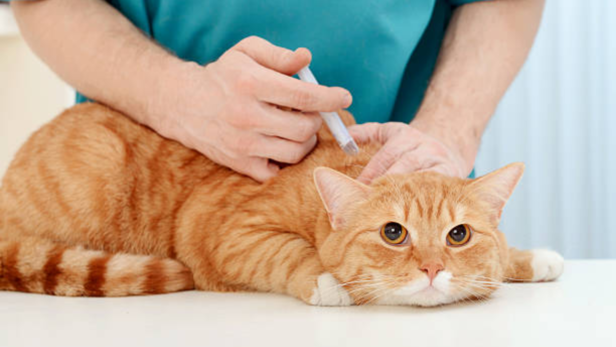The ultimate guide to pet vaccinations: What you need to know
News Desk | Apr 23, 2025, 19:15 IST
( Image credit : Times Pets )
Stay on track with your pet’s health using our detailed pet vaccination schedule. Learn the right time for first vaccinations for pets, including a clear puppy vaccination schedule and kitten vaccination schedule. Protect your furry friends from preventable diseases with timely vaccines. This essential guide helps ensure your pets grow up healthy, happy, and protected.
Getting your pet vaccinated is one of the most critical things you can do to ensure their long-term health and happiness. Similar to how vaccines work in humans, vaccines for pets prevent deadly diseases by getting their immune system ready to fight infections. Whether you have a new puppy or kitten or you're playing catch-up on your pet's vaccination schedule, being educated about the proper vaccines at the proper time can make a huge difference. From early-stage immunisation to booster shots, this is a step-by-step guide on pet vaccination, including puppy and kitten vaccination schedules, and what can be expected in the first round of vaccination.
Puppies, being young and growing, are very susceptible to infection. That's why their vaccination process starts early, usually at six to eight weeks of age. The first set of vaccinations is against distemper, parvovirus, and canine hepatitis. These are classified as core vaccinations, essential to your puppy's health and well-being.
The puppy vaccination schedule generally consists of a series of vaccinations spaced every 2–4 weeks. Once the initial vaccination series at 6–8 weeks has been completed, the follow-up injections are administered at 10–12 weeks and then once more at 14–16 weeks. These are referred to as booster injections and serve to develop long-term immunity.
At around 12–16 weeks, puppies also receive their first rabies shot, which is legally mandated in many regions. Depending on your location and your vet’s recommendation, non-core vaccines like Bordetella (kennel cough), Lyme disease, and canine influenza may also be administered, especially if your dog will be in contact with other animals or travelling frequently.
Once the puppy is one year old, a booster dose is typically given for core vaccines. From there, most vaccines shift to a 1–3 year regimen, depending on the specific type and brand of vaccine employed.

Kittens, just like puppies, require protection from several infectious diseases that can influence their development in the early stages. Vaccination in kittens usually starts at 6–8 weeks of age. The minimum set consists of vaccination against feline calicivirus, feline herpesvirus (rhinotracheitis), and panleukopenia, referred to collectively as the FVRCP vaccine.
Similar to puppies, kittens need a series of boosters. Following the first shot, the follow-ups are administered at 9–12 weeks and again at 14–16 weeks. These repeated doses ensure that your kitten develops a robust immune response in its initial months.
The initial rabies vaccination is typically given at 12–16 weeks, depending on the local regulations and the vaccine. Your vet may also suggest other non-core vaccines like FeLV (feline leukemia virus) if your cat will be going outdoors or living in a multi-cat home.
As with dogs, booster shots are typically advised at one year and thereafter every one to three years based on your cat's lifestyle and the advice of your veterinarian.

Each pet is unique, and the actual vaccination schedule will differ based on breed, health status, local disease rates, and lifestyle. But a typical vaccination schedule can help pet parents navigate the process.
For canines, core vaccines are rabies, DHPP (distemper, hepatitis, parainfluenza, and parvovirus), and occasionally leptospirosis. Non-core vaccines, such as Lyme and Bordetella, are optional but frequently recommended for dogs who frequent grooming parlours, dog parks, or boarding kennels.
Dogs also have a core set of vaccines, such as rabies and FVRCP. The vaccine for feline leukaemia is also usually recommended, depending on exposure risk. Your veterinarian can suggest booster shots every year or every three years, and in some cases, titer testing (a blood test to evaluate immunity) will decide if a booster is warranted.
The initial vaccinations for your pet are essential, as they offer the first line of protection against infectious diseases. They are given when maternal antibodies from the mother's milk start to fade, typically at 6–8 weeks of age. The initial visit to the vet may involve not only vaccines but also a general checkup, deworming, and talks on nutrition, socialisation, and preventive care.
It's also important to keep in mind that immunity doesn't start right away after a shot; there is time for the body to create antibodies. That's why there need to be several booster shots, and it's just as important not to expose young animals to strange animals before their shots are finished.
Vaccinations are an ongoing commitment that keeps your pet healthy, safe, and immune to contagious disease. Though schedules might differ slightly based on your pet's requirements and surroundings, consistent veterinary checkups and sticking to vaccination schedules can provide peace of mind and a long, healthy life for your pets. Early vaccination, regular boosters, and yearly checkups are very important. If you’re ever unsure about which vaccines your pet needs, your veterinarian is the best source of guidance tailored to your pet’s specific lifestyle and risk factors.
Puppy vaccination schedule
The puppy vaccination schedule generally consists of a series of vaccinations spaced every 2–4 weeks. Once the initial vaccination series at 6–8 weeks has been completed, the follow-up injections are administered at 10–12 weeks and then once more at 14–16 weeks. These are referred to as booster injections and serve to develop long-term immunity.
At around 12–16 weeks, puppies also receive their first rabies shot, which is legally mandated in many regions. Depending on your location and your vet’s recommendation, non-core vaccines like Bordetella (kennel cough), Lyme disease, and canine influenza may also be administered, especially if your dog will be in contact with other animals or travelling frequently.
Once the puppy is one year old, a booster dose is typically given for core vaccines. From there, most vaccines shift to a 1–3 year regimen, depending on the specific type and brand of vaccine employed.

Puppy vaccination
( Image credit : Times Pets )
Kitten vaccination schedule
Similar to puppies, kittens need a series of boosters. Following the first shot, the follow-ups are administered at 9–12 weeks and again at 14–16 weeks. These repeated doses ensure that your kitten develops a robust immune response in its initial months.
The initial rabies vaccination is typically given at 12–16 weeks, depending on the local regulations and the vaccine. Your vet may also suggest other non-core vaccines like FeLV (feline leukemia virus) if your cat will be going outdoors or living in a multi-cat home.
As with dogs, booster shots are typically advised at one year and thereafter every one to three years based on your cat's lifestyle and the advice of your veterinarian.

Kitten vaccination
( Image credit : Times Pets )
Pet vaccination schedule
For canines, core vaccines are rabies, DHPP (distemper, hepatitis, parainfluenza, and parvovirus), and occasionally leptospirosis. Non-core vaccines, such as Lyme and Bordetella, are optional but frequently recommended for dogs who frequent grooming parlours, dog parks, or boarding kennels.
Dogs also have a core set of vaccines, such as rabies and FVRCP. The vaccine for feline leukaemia is also usually recommended, depending on exposure risk. Your veterinarian can suggest booster shots every year or every three years, and in some cases, titer testing (a blood test to evaluate immunity) will decide if a booster is warranted.
First vaccinations for pets
It's also important to keep in mind that immunity doesn't start right away after a shot; there is time for the body to create antibodies. That's why there need to be several booster shots, and it's just as important not to expose young animals to strange animals before their shots are finished.
Vaccinations are an ongoing commitment that keeps your pet healthy, safe, and immune to contagious disease. Though schedules might differ slightly based on your pet's requirements and surroundings, consistent veterinary checkups and sticking to vaccination schedules can provide peace of mind and a long, healthy life for your pets. Early vaccination, regular boosters, and yearly checkups are very important. If you’re ever unsure about which vaccines your pet needs, your veterinarian is the best source of guidance tailored to your pet’s specific lifestyle and risk factors.
- What is the puppy vaccine schedule?The puppy vaccination schedule starts at 6–8 weeks with an initial series of core vaccines, such as DHPP (distemper, hepatitis, parainfluenza, and parvovirus). Booster shots are administered every 3–4 weeks until around 16 weeks of age. The rabies vaccine is usually administered at 12–16 weeks. Subsequent booster doses are normally given at one year and then every 1–3 years, based on the vaccine and your veterinarian's recommendation.
- What is the vaccine schedule for new kittens?New kittens should start at 6–8 weeks of age. The first FVRCP (feline viral rhinotracheitis, calicivirus, and panleukopenia) injection is followed by boosters every 3–4 weeks for about 16 weeks. Rabies is usually given at 12–16 weeks. Based on lifestyle and exposure risk, additional vaccinations such as FeLV (feline leukemia) can be included.
- What's the normal core vaccination schedule for dogs and cats?For dogs, core vaccinations are DHPP and rabies, typically given between 6 and 16 weeks of age. They are boosted at one year and then every 1 to 3 years. For cats, core vaccinations are FVRCP and rabies, with a similar schedule. The specific schedule will vary slightly by region, vet advice, and the individual pet's health and lifestyle.Discover expert advice and the latest tips on pet care, training, health, and more. Stay updated with all things pets at Times Pets!
